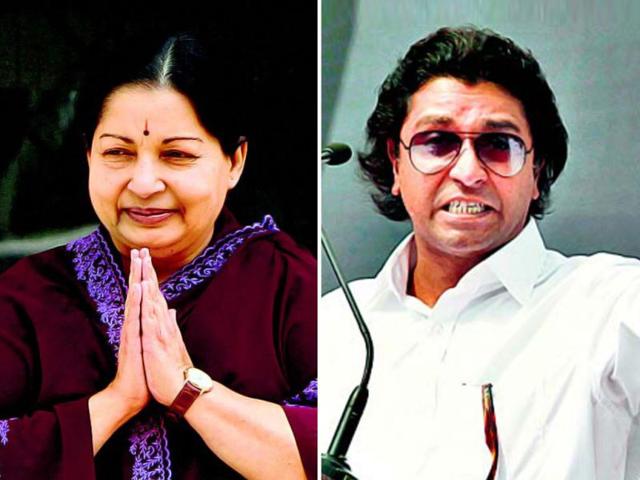What a tragic fall
The politics of emancipation was once the hallmark of leaders from Tamil Nadu and Maharashtra. Today this has given way to the politics of vengefulness and nepotism. Ramachandra Guha writes.
Last year I travelled to Sri Lanka on work; my previous visit had been a decade earlier. The people were, as before, gentle and polite; the scenery spectacular; the roads and residences, spotlessly clean. But the political culture had changed in the interim. An air of Sinhala superiority was abroad. A war had been waged and won; what had been imposed afterwards, however, was a victor's peace. Instead of assuring the Tamils that their rights would be protected, the idea that only Sinhala-speakers and followers of the Buddhist faith were authentic citizens was being promoted. The army had not disbanded its units in the north; there were fears that large numbers of non-Tamils would follow them and settle there.

These chauvinistic policies were accompanied by a promotion of the First Family of Sri Lankan politics. Photographs of the president, Mahinda Rajapaksa, were everywhere. His brother, Gotabaya, was making loud and threatening noises at regular intervals. While I was in Sri Lanka the President's son was engaged in an electoral campaign, and the notion that he would one day succeed to his father's office was being broadcast to anyone who cared to listen.
As I said earlier, the war against Velupillai Prabhakaran and the Liberation Tigers of Tamil Eelam (LTTE) was necessary, and just. The Tamil Tigers were a band of bloodthirsty brutes. However, once the war was won, a wise and far-sighted regime would have reached out to the Tamils. The acts of discrimination that had irked them, and polarised the country, would have been reconsidered. A key contributory factor in the disenchantment of the Tamils had been making Buddhism the State religion in 1972. After the war, if that privileged status for Buddhism and Buddhists had been withdrawn, the Tamils would have begun to feel at home again.
Religious majoritarianism combined with political authoritarianism - that, tragically, is the cast of Sri Lankan politics today. In my walks and talks in Colombo last year, I was reminded sometimes of Narendra Modi's Gujarat and at other times of Indira and Sanjay Gandhi's Emergency.
The political climate in Sri Lanka today is depressing. That said, the recent incidents in Tamil Nadu, aimed at intimidating Sri Lankan visitors to the state, are deplorable. The chief minister's stoppage of a football match, and the suspension of the official organising it, was a petty and vindictive act. Sri Lanka and India are not at war. Cultural and sporting exchanges tend to assuage fears and banish feelings of mistrust. Just a few weeks earlier, musicians and dancers from Tamil Nadu had performed to much applause in Jaffna. The goodwill generated by that festival was undone by the banishment of the Sri Lanka footballers.
The chief minister's recent aggressive postures are perhaps linked to the fact that her main political competition, the DMK, has historically been far closer to the political leadership of the Sri Lankan Tamils. She, and her party, think that they now need to 'prove' that they care more for their brethren across the Palk Straits. However, by acting in such an arbitrary fashion, the state has only encouraged non-state actors to stoke the flames further. Thus Vaiko's MDMK sought to show that their 'love' for the Tamils on the other side was even more intense than that of the chief minister. Hooligans set upon pilgrims from Sri Lanka, and attacked them.
Even as these nasty incidents occurred in Tamil Nadu, across the country, in Maharashtra, that state's politicians were competing with one another to display their hatred for the 'outsider', in this case, innocent Biharis rather than innocent Sri Lankans. Here, too, the chauvinism has run across party lines. More recently, it is the rival cousins, Uddhav and Raj Thackeray, who have threatened and abused other Indian citizens. In the past, however, it has been politicians of other parties, such as the NCP and the Congress, who have banned and burnt books and attacked and intimidated writers they deem not sufficiently 'Maharashtrian'.
To the historian, it is ironical, and tragic, that this kind of competitive chauvinism should be so dominant in Tamil Nadu and Maharashtra. For these two states once were in the vanguard of progressive social reform. The first modernists in India were the Bengalis. Rammohan Roy and Ishwar Chandra Vidyasagar in particular worked tirelessly to promote access to modern education and to emancipate women from the shackles that bound them. From the latter decades of the 19th century, however, the baton shifted to Maharashtra, and, in time, to Tamil Nadu. The challenges to caste discrimination; the movement to emancipate women; the spread of modern education and a rationalist outlook - these necessary social projects were undertaken with greatest zest in the Maratha and the Tamil country.
Once, leaders in these states worked to spread education and equality. Now they seek only to stoke the baser sides of human nature. The politics of emancipation has given way to the politics of nepotism and vengefulness. The state that once produced Phule, Gokhale, Ambedkar, Pandita Ramabai and YB Chavan now has as its leaders the Thackerays and Sharad Pawar. The state that gave birth to or was home to Iyothee Thass, G Subramania Iyer, EV Ramaswamy, Ammu Swaminadhan, K Kamaraj and CM Annadurai is now represented to the world - and to itself - by J Jayalalithaa, MK Stalin and Vaiko.
There may be no other states of the Union that have witnessed such a precipitous fall in the quality of their political leadership as Tamil Nadu and Maharashtra. This grim conclusion will, I think, be shared by most citizens of those states, and by non-Tamils and non-Maharashtrians who know something of this history as well.
Ramachandra Guha is the author of India After Gandhi and Makers of Modern India
The views expressed by the author are personal





